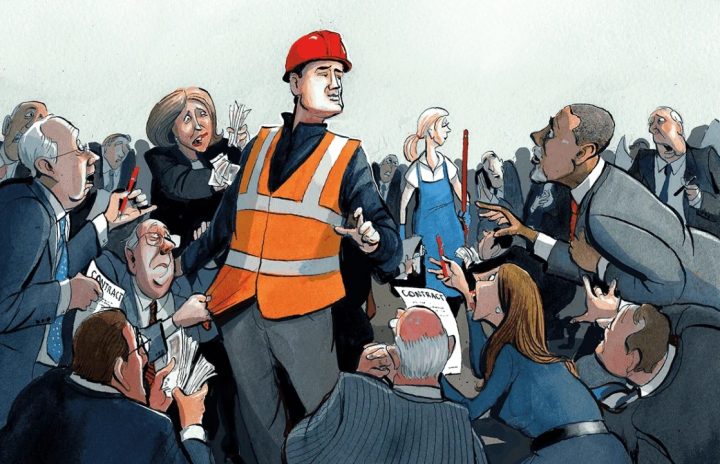When inflation was at 5.5 per cent and rising in January 2022, the BBC’s Faisal Islam adopted a look of amazement when he asked the governor of the Bank of England, Andrew Bailey: ‘So you’re trying to get inside people’s heads and ask them not to ask for too high pay rises?’ ‘Broadly, yes,’ Bailey stepped into the trap, ‘It’s painful, but we need to see that in order to get through this problem more quickly.’
The governor was slated for insensitivity, critics making much of his own half-million package. That 38-second clip did more to make his out-of-touch reputation than any of his other stumbles. But he wasn’t wrong.
The risk was always that as external inflation factors led by energy costs receded, rising wages would overtake as the driving force, obliging the Bank to raise interest rates higher and longer – and thereby inflicting at least as much pain as greater wage restraint might have done.
And that’s precisely where we are now, with private sector wage growth at 8.2 per cent, ahead of inflation at 6.8 per cent in July, and public sector settlements racing to catch up. ‘Unsustainable’, says Bailey in sadness, having also told Faisal Islam: ‘I don’t want, in any sense, to sugar the message.’ He certainly didn’t – and it can be no consolation that, just for once, his forecast was spot on.
Perpetually messy
Financial disasters, like wildfires, lead news bulletins only until something more eye-catching displaces them. Once a bank has been bailed out, the media lose interest. Credit Suisse, we might assume, is now tucked peacefully inside UBS, which absorbed its failing rival in March. But the reality of such episodes is rarely so tidy or finite. On the positive side, UBS says it no longer needs ‘backstop’ loss guarantees from the Swiss government. On the negative, more than half of Credit Suisse’s 45,000 staff are likely to be culled as the Credit Suisse brand itself is expunged outside its home country; and an army of small investors are suing for their losses in the giveaway takeover.
Likewise in March, I described HSBC’s weekend rescue of Silicon Valley Bank’s UK arm as ‘impressively swift’. But how has it been, I wondered, for the 3,000-plus customers, mostly entrepreneur-led smaller companies, who found themselves switched from SVB UK to HSBC’s new ‘Innovation Banking’ arm? Chaos, one of them tells me: cards cancelled, direct debits lost, scant information, no one on the end of the phone. ‘Honestly,’ he concludes, ‘You couldn’t make this stuff up.’ Indeed we don’t: financial life, like much else that makes the news, is perpetually messy and strewn with human error.
Praise for bean-counters
Pursuing that theme in another direction, I observe that no one ever erects monuments to accountants. Disparaged as bean–counters, theirs is an unseen profession until something goes wrong – for the likes of Arthur Andersen, the multinational firm so stained by shabby audit work at Enron, the fraudulent Texan energy giant, that it had to close down in 2002. Among the surviving ‘big four’, at less terminal levels of shame, Deloitte, KPMG and PwC all took flak, for example, for their roles with the failed UK outsourcing contractor Carillion in 2018, while EY will forever be known as the auditor of Wirecard, the German fintech star that imploded in 2020.
Yet accountants are also the front line between hard-pressed business managers and unreachable tax bureaucrats – and the dunghill-diggers tasked with retrieving whatever remains when ventures fail. This week I’ve found two to salute. The first is Tom Southward of the small firm of JF Hornby & Co in Ulverston, Cumbria. One of his clients has just received a reply from the taxman to a request for a ‘simple administrative change’ submitted in January 2020. In June this year, HMRC wrote back – to say they could not complete the request. ‘We’re used to dealing with incompetence and unanswered calls,’ says Tom, ‘But three and a half years really does take the biscuit. HMRC is on its knees.’ I hope they don’t penalise him for saying so.
My second nominee is Brian Smouha, who died in June. A former Deloitte partner, Smouha was the heroic liquidator of both Banco Ambrosiano – the Vatican-linked institution whose chairman Roberto Calvi was found hanged under Blackfriars Bridge in 1982 – and a decade later, the fraud–ridden Bank of Credit and Commerce International. With operations in 70 countries, BCCI became the most complex bank unwinding ever undertaken. But Smouha’s team eventually recovered 100 per cent of its creditors’ money, setting a textbook example of how the job is done. And at least his surname is carved in stone in Alexandria, Egypt, where his enterprising grandfather drained a lake to develop the elegant suburb of Smouha City.
Rendezvous à deux
Continuing my other current theme of praise for France – pour irriter les francophobes, as it were – I found a letter from the Direction Générale des Finances telling me I was overdue registering my house as a second home and at risk of a penalty. In trepidation I dialled the number; within five minutes, after a couple of push-button choices, a female voice answered. She was sympathetic but struggling to find me in her database; as her search dragged on, she started laughing and so did I; finally, the task was done and we congratulated each other. If I’d been bolder I’d have invited her out to lunch. Try that with HMRC.
And speaking of lunch, as I often do, here’s a tip for anyone passing through Bergerac airport. The adjacent Jardiland garden centre has both well-stocked wine shelves and a pleasant courtyard restaurant offering a €20 three-course menu. Its out-of-town retail frontage and shady car park also make it ideal for a discreet rendezvous à deux: I wondered whether the whispering couple next to me might be a local accountant entertaining my tax lady.







Comments